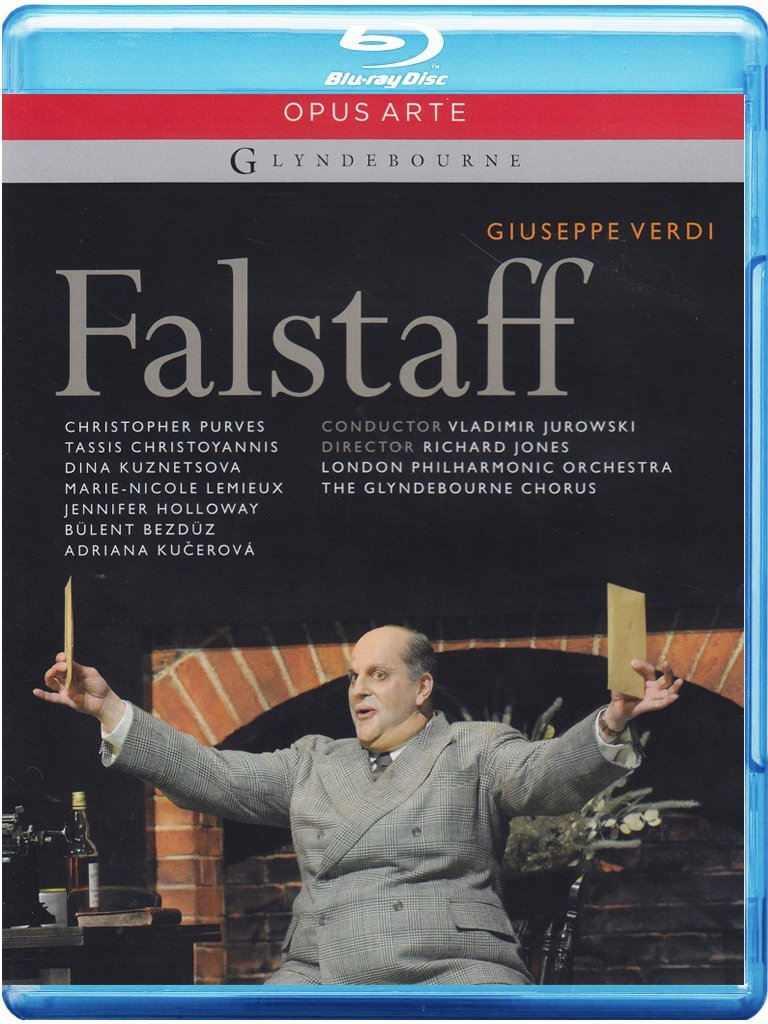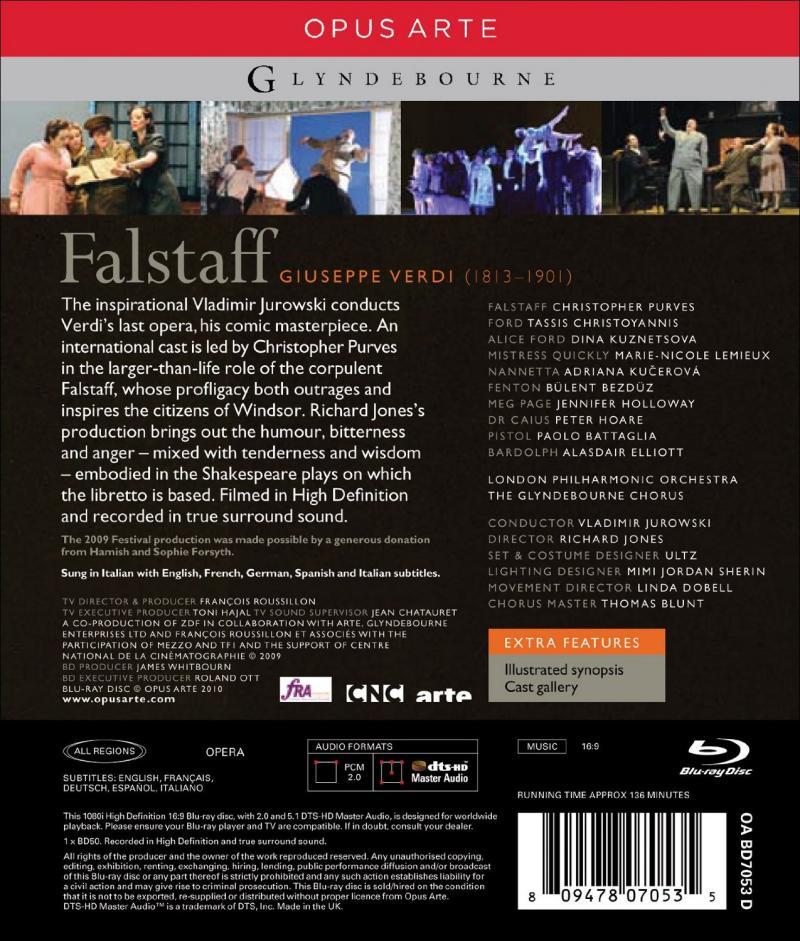

Verdi Falstaff opera to libretto by Arrigo Boito. Directed 2009 by Richard Jones at Glyndebourne. Stars Christopher Purves (Falstaff), Tassis Christoyannis (Ford), Dina Kuznetsova (Alice Ford), Marie-Nicole Lemieux (Mistress Quickly), Adriana Kučerova (Nannetta) Bülent Bezdüz (Fenton); Jennifer Holloway (Meg Page), Peter Hoare (Dr. Caius), Paolo Battaglia (Pistol), and Alasdair Elliott (Bardolph). Vladimir Jurowski conducts the London Philharmonic Orchestra (Leader Pieter Schoeman) and the Glyndebourne Chorus (Chorus Master Thomas Blunt). Set and costumes by Ultz; lighting by Mimi Jordan Sherin; movement direction by Linda Dobell. Directed for TV by François Roussillon; Toni Hajal was Executive Producer; Sound Supervisor was Jean Chatauret. Sung in Italian. Released in 2010, disc has 5.1 dts-HD Master Audio sound. Grade: A
This was Verdi's last opera and one of his only two comic works (out of 26). It was finished when he was over 80 years old. It was also his third to be based on Shakespeare (after Macbeth and Otello), drawing its inspiration from The Merry Wives of Windsor and Henry IV, Parts 1 and 2. Falstaff is admired for its brilliant orchestration, scintillating libretto, and refined melodic invention. In this Glyndebourne production, Jones chooses to update to a post World War II setting.
Falstaff the Great (Christopher Purves):
Falstaff the Philosopher gives his famous speech on Honour;
Falstaff the Troubadour sends identical love letters to two ladies in Windsor, Alice Ford and Meg Page. Falstaff barely knows Alice and Meg, whereas everybody in Windsor knows well his Lordship. But most unfortunate for Sir John, Alice and Meg know each other. Below we meet, from left to right, Alice Ford (Dina Kuznetsova), Mistress Quickly (Marie-Nicole Lemieux), Nannetta Ford (Adriana Kučerova), and Meg Page (Jennifer Holloway):
Verdi adds a sub-plot of young lovers, Nannetta Ford and her sweetheart Fenton (Bülent Bezdüz). They yearn to marry, but Mr. Ford doesn't think Fenton is good enough for his daughter:
Alice and Meg resolve to teach Sir John a lesson. They send Mistress Quickly to Falstaff to arrange an assignation between him with Alice at her home, located right over the Thames, while Mr. Ford is out. The ladies plan to dump Falstaff in the river:
Falstaff the Mastermind takes the bait:
Certain unhappy associates of the portly knight alert Mr. Ford (Tassis Christoyannis) that all is not well. Mr. Ford, who doesn't know about the letter to Alice or the plot of the ladies, introduces himself under a false name to Falstaff. Falstaff then proceeds to brag of his latest conquest at the expense of Mr. Ford. Oops! Ford takes the bait also!
Mistress Quickly mocks his Highness as she reports back to Alice and Meg:
Sir John woos Alice:
The ladies planned to lie to John that Mr. Ford was coming. But suddenly he really is there at the head of a lynch mob! Sir Dumpling has hidden in the laundry basket!
The dumping of Sir Dumpling:
John retreats to the Inn and gives his famous speech on the end of civility:
He thinks of suicide:
Sir John the Introspect:
Time passes. The Lord of Lard blames Mr. Ford for his dunking and still hopes for success another day with Alice. Realizing that he hasn't learned his lesson, Alice contrives to lure John dressed in costume to a local midnight festivity. In a typical Shakespearian scene of mass confusion and surprising endings, Nannetta tricks Mr. Ford into blessing her marriage to Fenton and John the Just gets the bill for the party:
But each time I watch this, I find myself laughing harder and harder. The directing and the comic acting of the singers makes this a funny, funny show. Christopher Purves is hilarious without being silly, Marie-Nicole Lemieux is an unforgettable Mistress Quickly, and Tassis Christoyannis as Ford comes up with physical comedy (when he thinks he has discovered his wife cheating) that Mr. Bean himself would admire.
This opera is also considered to be one of Verdi's greatest achievements. Antony Craig, writing in the September 2012 Gramophone (pages 92 and 93), ranks Verdi's Falstaff as "one of the greatest of all operas." He then goes on to pick the 10 best recordings of Falstaff in all history by all conductors. He calls subject title Falstaff with Christopher Purves the third best recording ever. That's based on the music alone. Our Falstaff is the only video in Craig's big 10. So with this disc, you get one of the best music recordings of Falstaff in history and you also get to see it in HD in your home. So this gets a solid "A."
Here's a funny clip:
OR






















